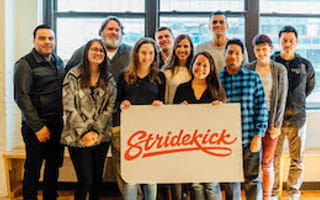
One of the biggest advantages of wearable fitness devices is the ability to share your activity with friends and family so that you can cheer each other on and keep each other accountable. But the fitness tracker market is still really fragmented, and consumers are often left with a choice between the tracker they prefer and the tracker their friends decided to go with.
Stridekick, a Chicago-based social fitness tracking startup, makes it easier to engage with fellow worker-outers, regardless of their choice of tracker or smart phone.
“We cover over 90 percent of the market for wearables, allowing individuals to find or create communities and affinity groups to motivate each other to achieve healthy lifestyle activities together,” said co-founder and COO Anthony Knierim.
Those activities range from step challenges and active minute challenges to head-to-head mileage competitions, depending on the user’s goals and current level of fitness. For someone just starting to think about their health, you might join a group of people who share a goal of increasing their daily steps. If you’re a marathoner, you might get paired with a fellow runner to compete for the most miles logged in a week.
“We’re trying to get people to motivate each other together within a similar range,” said Knierim. “We do that through challenges and through content and influencers on our platform.”
Knierim said the idea behind Stridekick came about when he and co-founder John Contreras realized that customers were using wearables in a different way than manufacturers anticipated.
“Early on, the industry had this a bit wrong in thinking that individuals were buying these devices to look at the data and optimize their health,” said Knierim. “We spend a lot of time looking at Fitbit and Jawbone community groups and boards, and one of the most common things you see there is individuals [asking others to cheer them on]. There’s thousands of these threads.”
Born out of that discovery, one of Stridekick’s key features is affinity groups for everything from Chicago runners to new mothers, and the people running these groups can set up challenges for other members. For those looking to work out with a group of friends, family or colleagues, there’s also an option to create closed groups.
Knierim said the app’s community is largely driven by power users who build communities and help hundreds of people stay on track to meet their goals.
“It’s been fascinating to watch, because a lot of the time, these people aren’t even trainers or coaches, but we’ve had hundreds of people telling us they think they work for us and want to meet them,” he said. “It’s kind of an organic thing that happens. We don’t employ any of those people — it’s just an interesting community effect.”
From a technology perspective, Knierim said one of the biggest challenges has been to capture data from the range of different devices out there and make the experience as uniform as possible, regardless of the device users have.
“We’re a really engineering-heavy team, and that’s definitely one of our core strengths,” he said. “We standardize data and do scoring in near real-time, for instance. If you’re one hardware provider, scoring might sound simple to you, but when you’re aggregating data across all different devices and you have 10,000 people in a challenge, being able to score in seconds is a pretty tremendous feat.”
Stridekick also recently started supporting accelerometers and gyroscopes on smartphones, lowering the barrier of entry and growing the company’s potential user base nearly tenfold overnight. But Knierim said one trend his team has been seeing is that a sizable number of users start off using their phones only to buy a tracking device later.
Stridekick is completely free for consumers, but the company offers premium services to companies and organizations who want to help their employees get in shape. Knierim said the company has over 350 corporate clients, and that most of the growth has come from consumers bringing the app to their employers. Stridekick has also partnered with municipalities including the city of Baltimore on public health campaigns.
With a current employee count of 11, Knierim said he hopes to expand the team to somewhere between 16 and 20 by the end of the year.
Images via Stridekick.
Is your company doing awesome things? Shoot us an email or tweet us @BuiltInChicago






